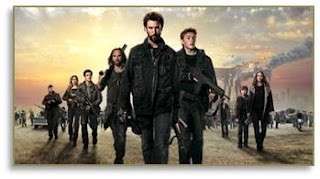Three programs either currently running on TV or about to return fit
into my favorite kind of science fiction.
They’re all on different channels and, unfortunately, I think only one
of them really works well.
 |
| Falling Skies |
The science fiction literary genre encompasses many sub-categories like
space travel, time travel, robotics, cyberpunk, and steampunk. One of my favorites is post-apocalyptic
dystopian fiction. That’s a big term for
a story in which nearly all of humanity dies, civilization is in ruins, and the
survivors try to survive and regroup.
Broadly speaking, PADF has four parts:
-
The Apocalypse: This may take any one, or a combination of, several types. There’s nuclear devastation (On the Beach, Nevil Shute; A Canticle for Liebowitz, Walter M. Miller, Jr.), biological disaster (The Stand, Stephen King), alien invasion (War of the Worlds, H.G. Wells), ecological calamity (Snowfall, Mitchell Smith), and source unknown (Dies the Fire, S.M. Stirling, The Road, Cormac McCarthy). The list is long and different people define it differently. I’m not including zombie fiction. Books like World War Z and Autumn have their own holocausts but fit more in horror than science fiction. The apocalypse, in whatever form, may be described in great detail or it may take place offstage, already complete and part of a new history.
- The Die-Off: Depending on the story and the extent of the holocaust, anywhere from 75% to 99% of the world’s people or the population of a specific country dies. The locations are often, but not always, the US or the UK. Only the very lucky, the naturally immune, the folks who live in remote areas, or the people on airplanes in flight might live. The survivors may have to deal with cleaning up the bodies or the bodies may have disappeared (incinerated, frozen, eaten, etc.).
- The Aftermath: This is when the survivors begin to find one another and form groups. As you would expect, there are good groups and bad groups. Once the semi-trailers stop rolling in to the supermarkets every week, food runs low and things start to get dicey. The good groups try to defend one another. They have to gather enough food to survive, find a place to hide or a defensible position, jury-rig weapons, or any combination of what’s needed. The bad guys are trying to get all the food, the best shelter, and the young women. When fresh meat can no longer be found in supermarkets, the easiest protein to catch and slaughter is, of course, other people.
- Building Anew: Given the constraints of whatever form the apocalypse took, the survivors then begin to rebuild a civilization. What form this new society takes often depends on what the new world looks like. It may be fire and ashes as in The Road, where renewal has barely begun, or ice as in Snowfall, where kingdoms fight where the glacier stop and Boston in the Ice has a different kind of civilization. There may be a new alien population or robots in charge. Agriculture may be underway or impossible. Above all, the world is no longer a safe place. Robots, dinosaurs, aliens, animals, or other people may be out to get you. Keeping a cool head and your wits about you are essential.
 |
| Revolution |
In some ways, these books are like video games because the reader
imagines how he/she would react. We all
think, of course, that we would be at least as brave and resourceful as the
hero or heroine. We know in our hearts
that we would keep our heads in a crisis and react in all the right ways. Sometimes we think of things that don’t occur
to the characters in the book. We know
that we would never eat funny meat.
 |
| Defiance |
So what form do the TV shows take?
Here’s the run-down:
- Defiance (@SyFy) – “In a near future where Earth is almost alien, a human drifter and his adopted Irathient daughter put down roots in Defiance, a community where humans and Votans coexist in the ruins of St. Louis.”
- Revolution (NBC) – @NBCRevolution takes place in a future where all electricity has been disabled on Earth over night. “People were forced to adapt to a world without electricity over the next fifteen years. Due to the collapse of government and public order, many areas are now ruled by warlords and militias.”
- Falling Skies (TNT) – @Falling SkiesTNT "opens in the chaotic aftermath of an alien attack that has left most of the world completely incapacitated. In the months since the initial invasion, the few survivors have banded together outside major cities to begin the difficult task of fighting back. Each day is a test of survival as citizen soldiers work to protect the people in their care while also engaging in an insurgency against the occupying alien force.”
No comments:
Post a Comment